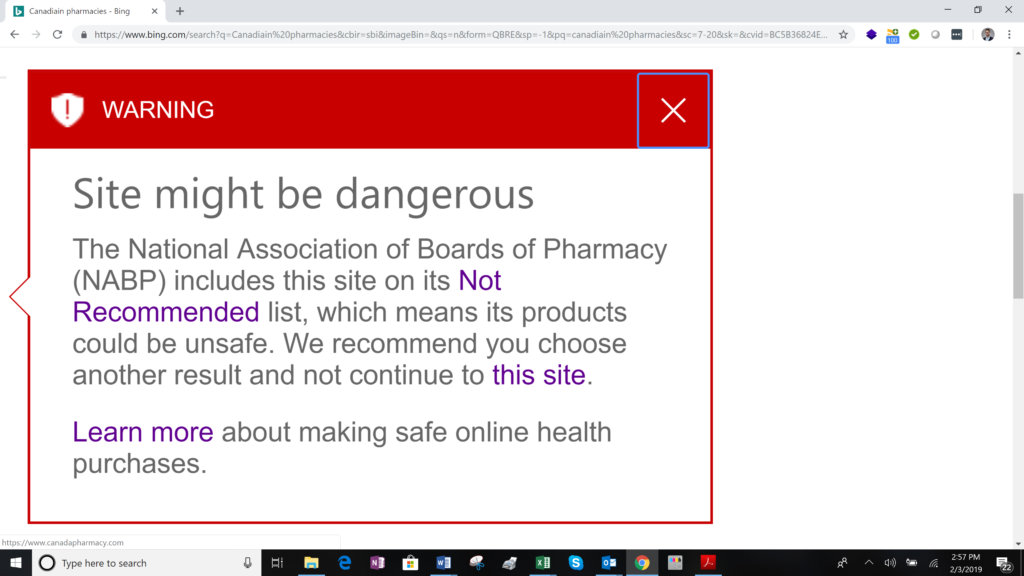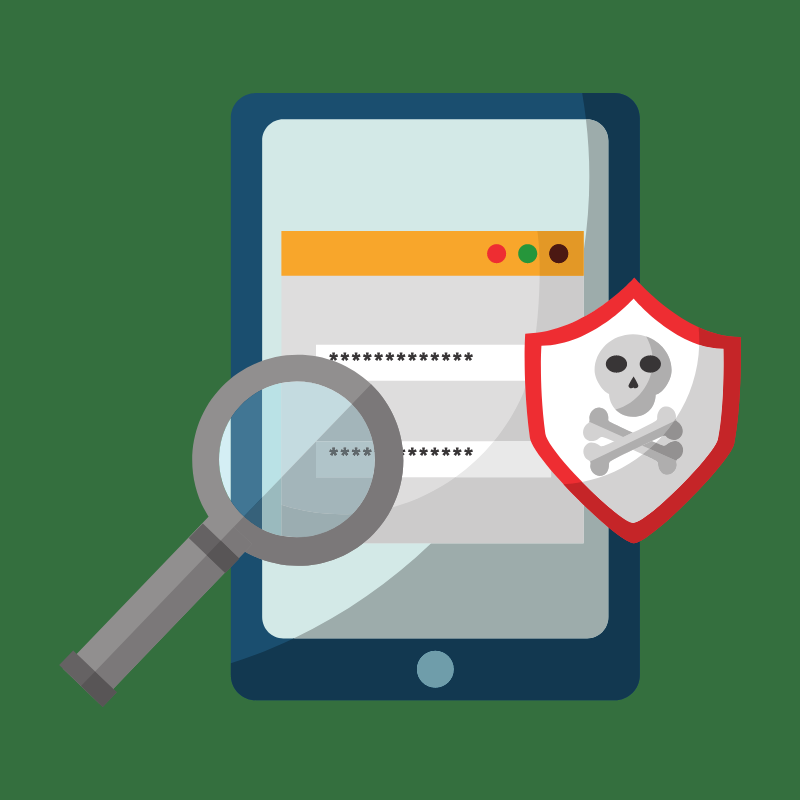According to a new study published by the American Enterprise Institute, the search engine Bing, which is owned by Microsoft, has added pop-up warnings to search results that increase the chances that web searchers will click to rogue online pharmacies. As the reports shows, Bing’s action appears to purposefully thwart safe personal importation of more affordable medicines. It is one of the clearest examples of censorship resulting from “voluntary agreements” among Internet companies, “encouraged” by regulators, that will threaten the health of patients buying medicine online under the guise of protecting them. Bing has placed warnings on its organic search results of Canadian-based and other international online pharmacies, yet the search engine fails to do so for many rogue websites, ones proven to sell counterfeit drugs. Here’s how that happened.
The problem is Bing’s use of the National Association of Boards of Pharmacy’s (NABP) Not Recommended List (NRL). Many of the NABP’s programs involving online sales of medicines and educating the public about online pharmacies are funded by drug companies, and therefore supportive of the industry’s profit-protecting goals against importation.
Bing’s Backwards Partnership with the NABP
NABP’s NRL is a product of its Internet Drug Outlet Identification Program, which was launched with a grant from the drug company, Pfizer. The NRL contains about 13,000 web addresses, most of which we would agree are rogue online pharmacies. However, the NABP’s NRL also includes safe international online pharmacies that are accredited and monitored by PharmacyChecker, and there are still countless rogue websites that are not on their list.
The result: when people search Bing looking to buy medicine online, they are warned against buying from sites that are proven to sell real, lawfully-manufactured medicines and end up buying counterfeit drugs from a rogue site that lacks Bing’s warning.
The AEI researcher, economist and drug safety expert, Roger Bate, tested Bing as if he was a consumer looking to purchase Viagra online. Search results would show a page of links to online pharmacies. Some of the top results are online pharmacies accredited by PharmacyChecker. Many such verified online pharmacies have been in business for 10-15 years and have never had a safety issue. They require prescriptions and process prescription orders filled by licensed pharmacies. When such links were clicked, a pop-up warning from Bing informs people that the site may be dangerous. Further down the search results, people find rogue sites that don’t require a prescription and don’t display the pop-up warning.

Bing’s System Encourages People to Order Counterfeit Medications
In the AEI study, Viagra was ordered from sites found on Bing. Out of the nine sites verified by PharmacyChecker and/or the Canadian International Pharmacy Association, all sent genuine, Pfizer Viagra.
Out of the thirteen sites (not verified by PharmacyChecker) that did not have Bing warnings, two sent fake Viagra.
This study proves that patients, including those buying medicines to treat high blood pressure, diabetes, depression, high cholesterol, and stroke, are scared away from online pharmacies that can help them and into the arms of a rogue online pharmacy.
The head of the NABP, Carmen Catizone, should know that this is wrong and endangering patients. Mr. Catizone has recognized that sites like PharmacyChecker help people, similar to the NABP’s VIPPS program. Microsoft, on the other hand, is ultimately responsible for using NABP’s NRL and should quickly reconsider its policy for Bing to reduce the damage already done by those who followed its bad advice.
As a reminder, last year, Google entered into an agreement, ostensibly voluntary, with the FDA that, based on administrative decisions by the agency, the search engine would remove organic results of sites that “illegally distribute material that risks physical harm to consumers.” That agreement is probably being used to remove websites selling illegal drugs, such as prescription opioids and fentanyl ingredients used to make counterfeit opioid drugs. Those actions are meant to protect the public. However, that authority could be abused by the FDA to remove safe international online pharmacies from organic results in Google. That action would fail to address the thousands of rogue pharmacy sites that would pop up in their place: sites that sell controlled drugs and/or don’t require a prescription.
At this time, Bing’s action is far more insidious than Google’s agreement with the FDA because it’s directly leading people to rogue sites, ones proven to sell counterfeit drugs. I have a feeling this was a bridge too far in what I view as Big Pharma’s effort to remove access of prescription savings available at international pharmacies.
Tagged with: AEI, Bing, Carmen Catizone, Google, NABP


